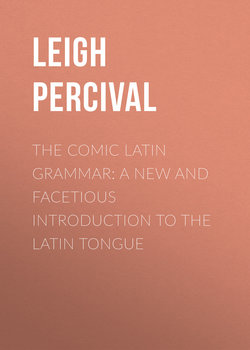Читать книгу The Comic Latin Grammar: A new and facetious introduction to the Latin tongue - Leigh Percival - Страница 4
COMIC LATIN GRAMMAR
ОглавлениеOf Latin there are three kinds: Latin Proper, or good Latin; Dog Latin; and Thieves’ Latin, Latin Proper, or good Latin, is the language which was spoken by the ancient Romans. Dog Latin is the Latin in which boys compose their first verses and themes, and which is occasionally employed at the Universities of Oxford and Cambridge, but much more frequently at Edinburgh, Aberdeen, and Glasgow. It includes Medical Latin, and Law Latin; though these, to the unlearned, generally appear Greek. Mens tuus ego – mind your eye; Illic vadis cum oculo tuo ex – there you go with your eye out; Quomodo est mater tua? – how’s your mother? Fiat haustus ter die capiendus – let a draught be made, to be taken three times a day; Bona et catalla – goods and chattels – are examples.
Thieves’ Latin, more commonly known by the name of slang, is much in use among a certain class of conveyancers, who disregard the distinctions of meum and tuum. Furthermore, it constitutes a great part of the familiar discourse of most young men in modern times, particularly lawyers’ clerks and medical students. It bears a very close affinity to Law Latin, with which, indeed, it is sometimes confounded. Examples: – to prig a wipe – to steal a handkerchief. A rum start – a curious occurrence. A plant – an imposition. Flummoxed – undone. Sold – deceived. A heavy swell – a great dandy. Quibus, tin, dibs, mopuses, stumpy – money. Grub, prog, tuck – victuals. A stiff-’un – a dead body – properly, a subject. To be scragged – to suffer the last penalty of the law, &c.
All these kinds of Latin are to be taught in the Comic Latin Grammar.
If Toby, the learned pig, had been desired to say his alphabet in Latin, he would have done it by taking away the W from the English alphabet. Indeed, this is what he is said to have actually done. The Latin letters, therefore, remind us of the greatest age that a fashionable lady ever confesses she has attained to, – being between twenty and thirty.
Six of these letters are called what Dutchmen, speaking English, call fowls – vowels; namely, a, e, i, o, u, y.
A vowel is like an Æolian harp; it makes a full and perfect sound of itself. A consonant cannot sound without a vowel, any more than a horn (except such an one as Baron Munchausen’s) can play a tune without a performer.
Consonants are divided into mutes, liquids and double letters; although they have nothing in particular to do with funerals, hydrostatics, or the General post office. The liquids are, l, m, n, r; the double letters, j, x, z; the other letters are mutes.
“Hye dum, dye dum, fiddle dumb– c.” – Sterne.
A syllable is a distinct sound of one or more letters pronounced in a breath, or, as we say in the classics, in a jiffey.
A diphthong is the sound of two vowels in one syllable. Taken collectively they resemble a closed fist – i.e. a bunch of fives. The diphthongs are au, eu, ei, æ, and œ. Of the two first of these, au and eu, the sound is intermediate between that of the two vowels of which each is formed. This fact may perhaps be impressed upon the mind, on the principles of artificial memory, by a reference to a familiar beverage, known by the name of half-and-half. In like manner, ei, which is generally pronounced i, and æ and œ, sounded like e, may be said to exhibit something like an analogy to a married couple. The human diphthong, Smith female + Brown male, is called Brown only.
The reason, says the fool in King Lear, why the seven stars are no more than seven – is a pretty reason – because they are not eight. This is a fool’s reason; but we (like many other commentators) cannot give a better one, why the Parts of Speech are no more than eight – because they are not nine. They are as follow:
1. Noun, Pronoun, Verb, Participle – declined.
2. Adverb, Preposition, Conjunction, Interjection – undeclined. Most schoolboys would like to decline them altogether.
